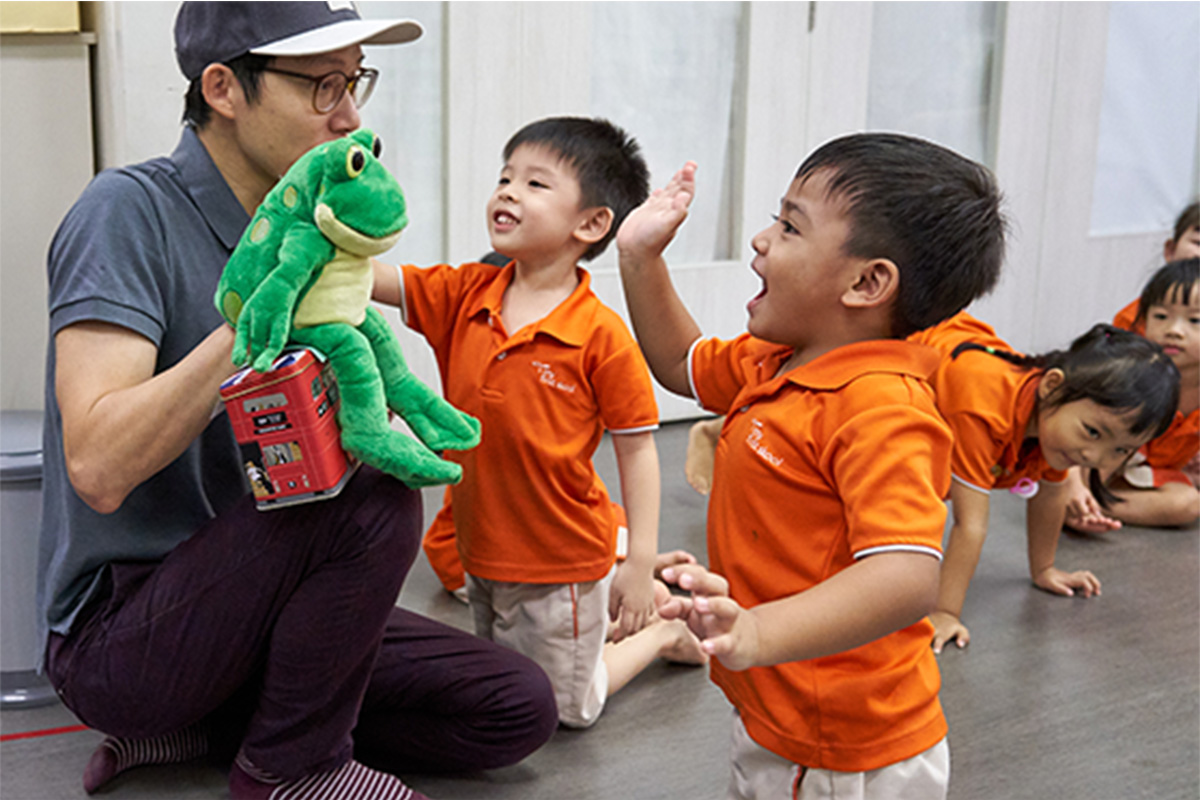In the last 20 years, early childhood education (ECE) sectors globally and in Singapore have widely recognised that high-quality preschool education must equip children not only with early academic knowledge and skills that shape them for lifelong learning, but also with good socio-emotional competencies, values, and dispositions. In Singapore, the Ministry of Education (MOE) has identified Social and Emotional Development (SED), understood as the basis for children to manage their feelings, thoughts, and behaviours, as one of six key learning areas that are essential for children’s holistic development. Indeed, studies have found SED to be the top learning priority for Singapore preschool teachers in their professional development.
The arts are a powerful tool for promoting social and emotional development. When teachers integrate music, drama, dance, and puppetry into their lessons, students get to explore and express their emotions, understand and appreciate the perspectives of others, and learn how to work together and solve problems collaboratively. Compelling research also shows that children learn best in supportive environments that encourage exploration and discovery through play and interaction.
With more than 40 years of experience in arts integration for early childhood education, the internationally renowned, research-based Wolf Trap approach provides ECE educators with hands-on ways to incorporate the arts and SED into daily teaching practices to great effect.
In Singapore, the Wolf Trap approach is offered by Singapore Theatre Company’s Centre for Creative Learning, the first overseas affiliate of the Wolf Trap Institute of Early Learning Through the Arts based in Washington, D.C. ECE educators will be mentored by highly qualified Wolf Trap Teaching Artists in arts and SED integration through classroom residencies for their professional development.
ECE educators who have undergone Singapore-Wolf Trap classroom residencies have observed that:
 |
Incorporating Songs & Storylines for Self-Regulation
“[My student] is an extremely energetic individual who tends to take time regulating her emotions and energy levels. It was wonderful to see how incorporating music with fast and slow rhythms as well as having a storyline helped her better understand what to expect and the energy levels needed for each part of the lesson/activity.”
Guided by music-trained Wolf Trap Teaching Artists, ducators gained a deeper understanding of how to incorporate different songs, lyrics, chants, and other musical forms into their lessons that would help students focus, self-regulate, and be ready for class. |
 |
Developing Dramatic Presence to Model Self-Awareness of Emotions
“[Going forward] I will integrate the strategy of being ‘dramatic’. It really helped me to get my children's attention and focus. It also helped them to stay engaged during the activities.”
Guided by drama-trained Wolf Trap Teaching Artists, educators developed heightened awareness of their bodies and stage presence as they learnt how to enact different voices, gestures, and expressions when introducing different characters to their students. As educators modelled and expressed a variety of emotions to their students, students started to develop self-awareness of their own emotions.
|
 |
Improvising with Dance Encourages Students’ Curiosity, Self-Expression, and Positive Relationships with Peers
“I was able to understand the elements of dance and lead dance improvisation strategies to help children stimulate their sense of wonder and curiosity.”
“Children demonstrated improvisation very well as they moved like the characters in the story, formed or made something using their body, worked in pairs and small groups. It was engaging to see the children’s attention and excitement as they interacted with friends [and] cooperated in forming different transportation [with their bodies]. I [also] love the part where children were introduced to different dances. They demonstrated self-expression as they moved to the music played.”
Guided by dance-trained Wolf Trap Teaching Artists, educators gained enhanced insight into dance techniques and improvisation that jumpstarted their students’ interest in learning, introduced new avenues for self-expression, and allowed them to collaborate positively with their peers.
|
 |
Puppetry Helps Students Confront Difficult Emotions in Safe and Fun Ways
“Using puppetry and simple props found in class, gestures and actions have drawn the interest and attention of the children. They were observed to be more focused and eager for what's to come next. Children were able to listen to instructions and at the same time learn new vocabularies [and] different types of feelings ...”
Guided by puppetry-trained Teaching Artists, educators gained dexterity in using everyday objects as props and puppets that offer safe and fun ways to act out difficult feelings and open up discussions of emotional topics that might be overwhelming for their students.
|
Ultimately, integrating music, drama, dance, and puppetry into preschool classrooms via the Wolf Trap approach can provide ECE educators with effective teaching strategies that enable them to be confident in preparing their students to become productive, self-aware, and socially-aware citizens beyond the classroom in the years to come.
Dr. Jenny Mak
Centre for Creative Learning, Officer
Singapore Theatre Company (STC)
Ready to Expand Your Skills in Arts Integration and SED?
The Singapore-Wolf Trap classroom residency is eligible for subsidy under the NAC-AEP Tote Board Grant.
To find out more about the Wolf Trap approach and the Singapore-Wolf Trap classroom residency, reach out to learning@singaporetheatrecompany.sg or contact 6221 5585.



